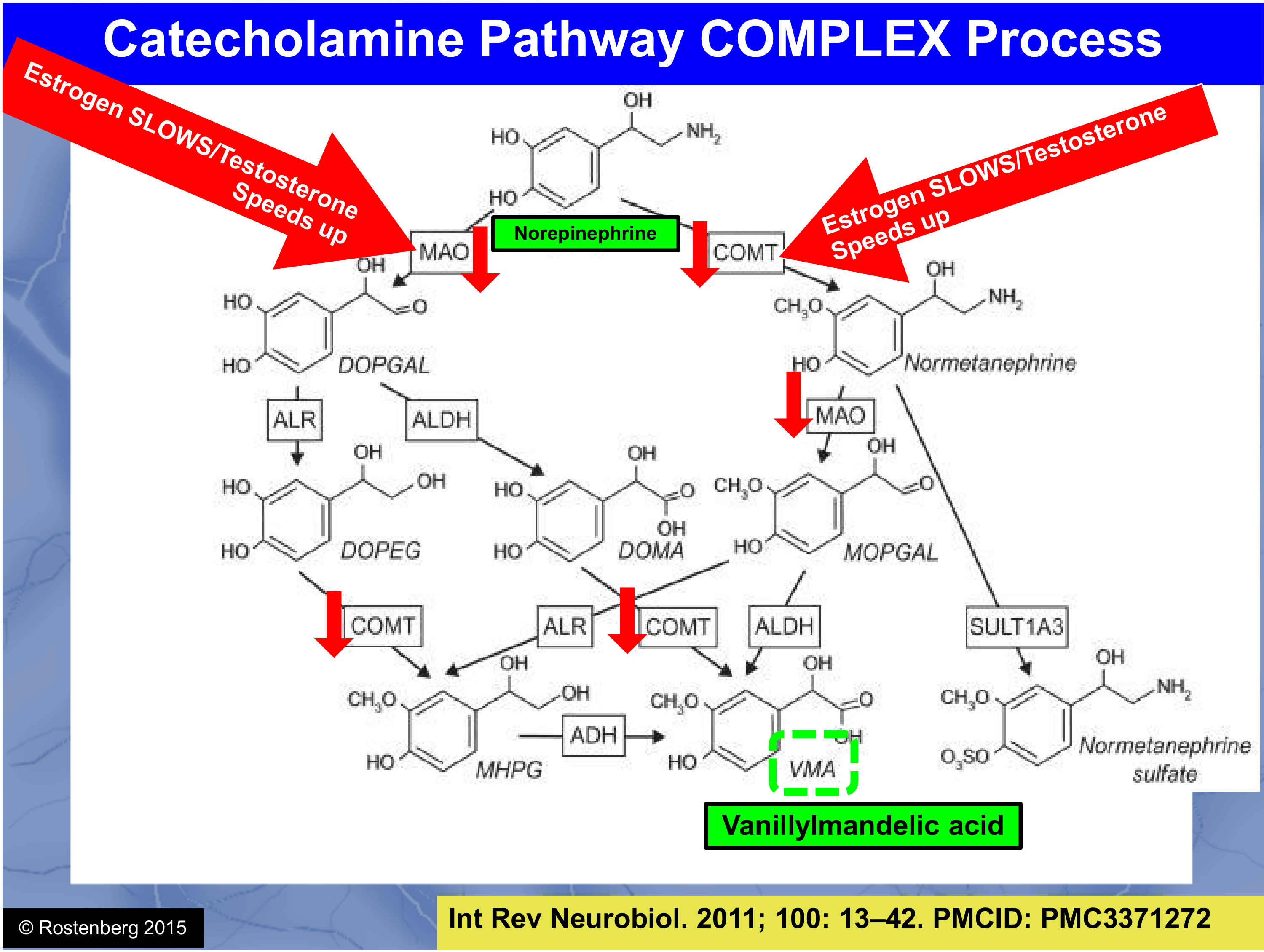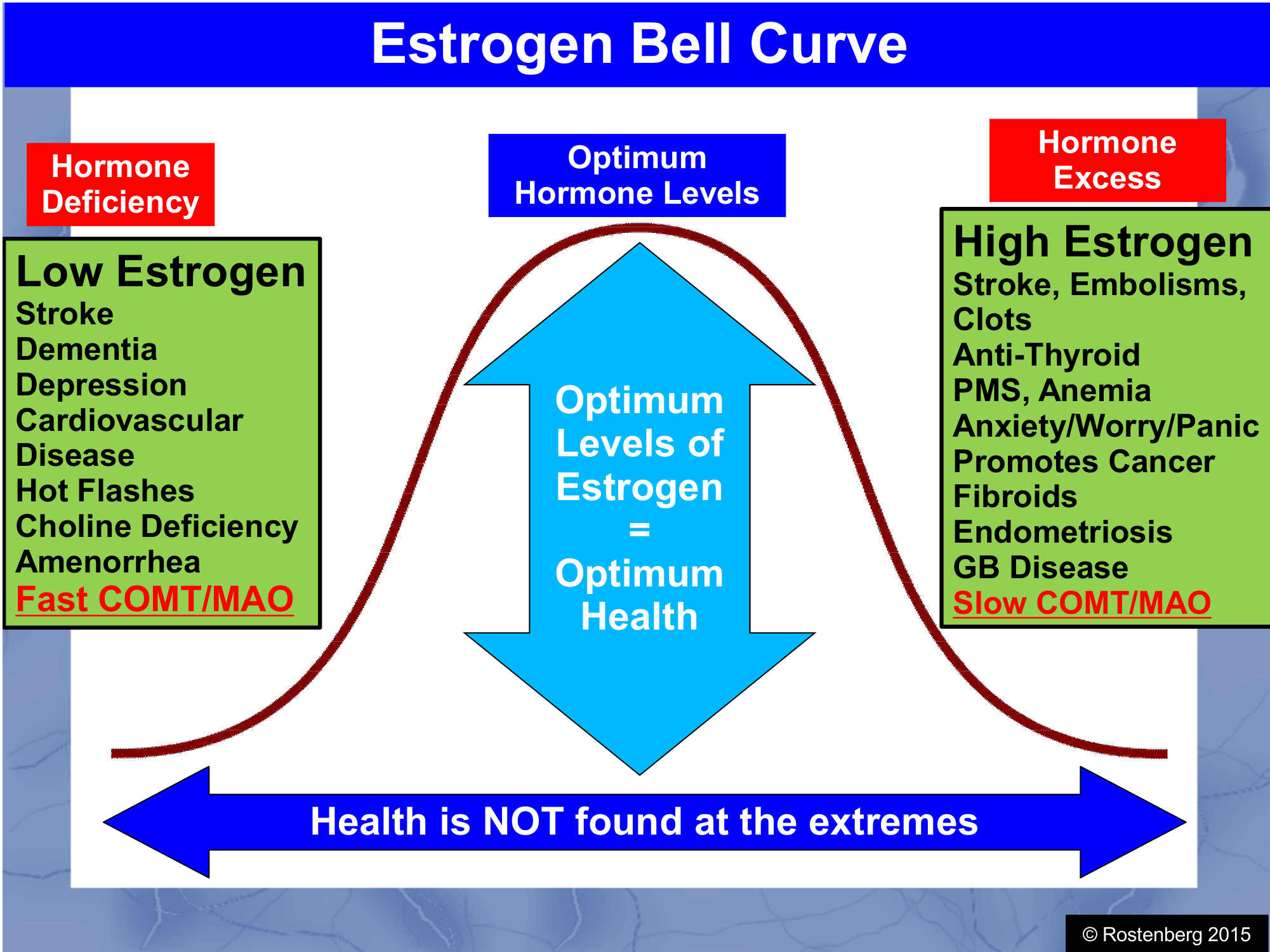Monday, April 01, 2019 10:32:23 AM
Overview of Sex Hormones, COMT and MAO
Many of you reading this article may have already performed a genetic test and are aware of your COMT and MAO status – and if you haven’t done that yet no worries. Some of you may have inherited COMT and MAO genes which are slowed compared to the normal or “wild-type”. And at first blush these genes seem like they are going to ruin your life. But as I often tell my patients the genes you inherit from your parents are not your destiny, but they are your tendency. At the end of the day the body’s environment has the biggest impact on how our genes influence our lives. With that in mind let’s look at how the hormonal environment shapes our body’s genetic tendencies.
Women have higher estrogen levels and men have higher testosterone levels – this fact cannot be disputed. What isn’t as well known is how these two hormones impact the metabolism of our neurotransmitters by altering the speed of the COMT and MAO pathways. You will remember from my previous post that the COMT breakdown of dopamine has a major influence on how we react to stress. And you are about to learn that our sex hormones play a major role in determining our brain neurotransmitter levels.
Studies now show that sex hormones also play a critical role in how much dopamine we have in our brain. So logically it makes sense that men and women will react to stress differently. Because sex hormones have such a strong influence on our COMT and MAO pathways, men and women will have different COMT and MAO speeds, even if the genes and SNPs are identical.
In other words, the hormones have an epigenetic effect on the methylation of neurotransmitters that is occurring independently of the individual’s genetics – apart from that person’s genotype. A woman can be born with a fast COMT -/- genotype and yet experience all the symptoms of someone who is COMT +/+ when she is overly estrogen dominant. She experiences the symptoms not because of her genotype, but because the environment is interfering with her methylation pathways. Confused yet? Well keep reading it will all make sense shortly.
To help clarify this point I would like to ask you a question. And by asking this question I am not intending to offend anyone, but this question helps to illustrate an important point:
If you were to interview randomly 100 men and 100 women off the street, who would you expect to describe themselves as more anxious? Men or Women? And who would you expect to describe themselves as more angry or grumpy?
While I haven’t performed this study yet, I can assure you what the answers will be. More women will describe themselves as feeling anxious; and more men will describe themselves as feeling grumpy and angry. At first blush this information may not seem fair and it may sound like I am picking on one group or another. However that is far from the truth!
What this idea illustrates is that women have more anxiety and men have more anger – and you will soon see why. Because of recent research showing how sex hormones influence brain chemistry and methylation-related pathways, we have a new level of understanding WHY women and men react differently to stress. The answer to why women and men react to stress differently has everything to do with how estrogen and testosterone influence the methylation and breakdown of neurotransmitters. Figure 1 shows how our sex hormones interfere with key methylation

.....
These studies help to explain scientifically why women have a tendency towards anxiety and worry – more estrogen leads to more dopamine, adrenalin and catecholamines in the brain. And men (as you will see below) have a tendency towards anger and depression – since more testosterone leads to lower catecholamines. Estrogen has an anti-depressant effect, but too much of it can cause a woman to be unable to relax and calm down, and too little can lead to excessive crying and depression. The body doesn’t want too much and it doesn’t want too little – it wants a balanced amount! Figure 2 below illustrates the many problems associated with unbalanced estrogen levels:

Full article
http://www.beyondmthfr.com/treating-comt-and-mao-the-hormonal-cause-of-stress-and-anxiety/
Recent AVXL News
- Anavex Life Sciences to Present at the H.C. Wainwright 26th Annual Global Investment Conference 2024 • GlobeNewswire Inc. • 09/03/2024 11:30:00 AM
- Form 10-Q - Quarterly report [Sections 13 or 15(d)] • Edgar (US Regulatory) • 08/06/2024 09:21:05 PM
- Anavex Life Sciences Reports Fiscal 2024 Third Quarter Financial Results and Provides Business Update • GlobeNewswire Inc. • 08/06/2024 11:30:00 AM
- Anavex Life Sciences to Announce Fiscal 2024 Third Quarter Financial Results on Tuesday, August 6, 2024 • GlobeNewswire Inc. • 08/01/2024 11:30:00 AM
- Form 8-K - Current report • Edgar (US Regulatory) • 07/30/2024 09:20:53 PM
- Anavex Life Sciences Announces Translational Biomarker Data for ANAVEX®2-73 (blarcamesine) in Fragile X Syndrome (Major Cause of Autism) at the 19th NFXF International Fragile X Conference • GlobeNewswire Inc. • 07/30/2024 11:30:00 AM
- Form S-3 - Registration statement under Securities Act of 1933 • Edgar (US Regulatory) • 07/29/2024 09:21:49 PM
- Results from Anavex Life Sciences Landmark Phase IIb/III Trial of Blarcamesine Presented at Alzheimer's Association Conference • GlobeNewswire Inc. • 07/28/2024 09:00:00 PM
- Anavex Life Sciences to Present at the H.C. Wainwright 5th Annual Neuro Perspectives Virtual Conference • GlobeNewswire Inc. • 06/20/2024 11:30:00 AM
- Form 4 - Statement of changes in beneficial ownership of securities • Edgar (US Regulatory) • 06/17/2024 11:30:10 AM
- Anavex Life Sciences Announces Expansion of Leadership Team • GlobeNewswire Inc. • 05/22/2024 11:30:00 AM
- Form 4 - Statement of changes in beneficial ownership of securities • Edgar (US Regulatory) • 05/17/2024 10:01:00 AM
- Anavex Life Sciences to Present at the H.C. Wainwright 2nd BioConnect Investor Conference at NASDAQ • GlobeNewswire Inc. • 05/14/2024 11:30:00 AM
- Shareholders that lost money on Anavex Life Sciences Corporation(AVXL) Urged to Join Class Action - Contact The Gross Law Firm to Learn More • PR Newswire (US) • 05/10/2024 09:45:00 AM
- Form 10-Q - Quarterly report [Sections 13 or 15(d)] • Edgar (US Regulatory) • 05/09/2024 08:35:55 PM
- Form 8-K - Current report • Edgar (US Regulatory) • 05/09/2024 12:00:30 PM
- Anavex Life Sciences Reports Fiscal 2024 Second Quarter Financial Results and Provides Business Update • GlobeNewswire Inc. • 05/09/2024 11:30:00 AM
- The Gross Law Firm Announces the Filing of a Securities Class Action on Behalf of Anavex Life Sciences Corporation(AVXL) Shareholders • PR Newswire (US) • 05/07/2024 09:45:00 AM
- Form DEFA14A - Additional definitive proxy soliciting materials and Rule 14(a)(12) material • Edgar (US Regulatory) • 05/06/2024 10:03:33 AM
- Anavex Life Sciences Corporation Sued for Securities Law Violations - Contact The Gross Law Firm Before May 13, 2024 to Discuss Your Rights - AVXL • PR Newswire (US) • 05/03/2024 09:45:00 AM
- Anavex Life Sciences to Announce Fiscal 2024 Second Quarter Financial Results on Thursday, May 9th, 2024 • GlobeNewswire Inc. • 05/02/2024 11:30:00 AM
- May 13, 2024 Deadline: Contact The Gross Law Firm to Join Class Action Suit Against AVXL • PR Newswire (US) • 04/26/2024 09:45:00 AM
- Contact The Gross Law Firm by May 13, 2024 Deadline to Join Class Action Against Anavex Life Sciences Corporation(AVXL) • PR Newswire (US) • 04/19/2024 09:45:00 AM
- The Gross Law Firm Reminds Shareholders of a Lead Plaintiff Deadline of May 13, 2024 in Anavex Life Sciences Lawsuit - AVXL • PR Newswire (US) • 04/16/2024 09:45:00 AM
North Bay Resources Commences Operations at Bishop Gold Mill, Inyo County, California; Engages Sabean Group Management Consulting • NBRI • Sep 25, 2024 9:15 AM
CEO David B. Dorwart Anticipates a Bright Future at Good Gaming Inc. Through His Most Recent Shareholder Update • GMER • Sep 25, 2024 8:30 AM
Cannabix Technologies and Omega Laboratories Inc. Advance Marijuana Breathalyzer Technology - Dr. Bruce Goldberger to Present at Society of Forensic Toxicologists Conference • BLOZF • Sep 24, 2024 8:50 AM
Integrated Ventures, Inc Announces Strategic Partnership For GLP-1 (Semaglutide) Procurement Through MedWell USA, LLC. • INTV • Sep 24, 2024 8:45 AM
Avant Technologies Accelerates Creation of AI-Powered Platform to Revolutionize Patient Care • AVAI • Sep 24, 2024 8:00 AM
VHAI - Vocodia Partners with Leading Political Super PACs to Revolutionize Fundraising Efforts • VHAI • Sep 19, 2024 11:48 AM








